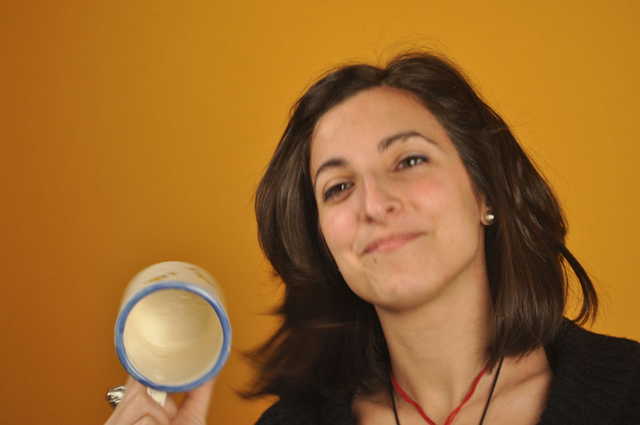She left a career as a researcher, which didn´t make her happy. The lack of opportunities in Spain brought her to one of the most fascinating capital cities for an art-lover such as herself.
 She left her family in Andorra, in the municipality of Teruel, to set off on a long road guided by her passion for art.
She left her family in Andorra, in the municipality of Teruel, to set off on a long road guided by her passion for art.
After a ten year career and a doctorate in the History of Art in Zaragoza, she felt she had to come to London to undertake her path.
This woman from Aragon has been in the British capital for one month, working for the Cultural Department at the Cervantes Institute. She is complementing this three month contract with another six months of work experience for the TRIAD organisation, dedicated to the promotion of emerging Latin American artists.
This is a new stage marked by the radical change which took place one year ago when she decided “that I didn´t want to dedicate the rest of my life to research”.
The grim picture painted by government cuts in research was not the only thing which encouraged her to change course for something for which she was already prepared.
She left it “because research is very solitary”, she explains. “Personally it brings you many things because it is very intense and this allows you to know yourself very well. But I wanted something more dynamic”.
 At the age of 30 she knows how to take advantage of opportunities which present themselves. She seems happy to be in an institution which remains “in contact with the best of Spanish culture”, she admits.
At the age of 30 she knows how to take advantage of opportunities which present themselves. She seems happy to be in an institution which remains “in contact with the best of Spanish culture”, she admits.
The fear she had a month ago about the English language and the cost of flats in London has passed. Now she needs to find a group of people to socialise with, although she confesses that this is not something which worries her too much. “I believe that it is at the beginning when you least miss people and it’s easier to be alone because you are always busy”.
She hopes that this London chapter might be the one which springboards her to find work in the world of culture. But she has to deal with the uncertainty produced by a situation where, in order to get started, one must pass periods of voluntary or unpaid work experience, she explains.
 She doesn´t know if her plans will work out well, but she is betting everything on the future she has always dreamt of. “Sometimes, you must lose in order to win”. She will have to remain firm in that belief she admits, when, in April, she will have to look for “any kind of work” in order to cover the end of her contract at the Cervantes Institute.
She doesn´t know if her plans will work out well, but she is betting everything on the future she has always dreamt of. “Sometimes, you must lose in order to win”. She will have to remain firm in that belief she admits, when, in April, she will have to look for “any kind of work” in order to cover the end of her contract at the Cervantes Institute.
She has come to a city which offers the most to a passionate art-lover such as herself. For example, she says she cannot stop going to the Victoria and Albert Museum, her favourite. She also enjoys seeing excellent examples of one of her favourite topics, the English Arts & Crafts Movement of the nineteenth century. She is enthused by the energy and the cultural offerings of the Capital: “Things never end. In the world of art and culture they are at the top”.
She is conscious of being of an age at which a lack of professional stability becomes frustrating. But she is a living example of how a lack of motivation gets you nowhere. “I believe that you must be realistic and optimistic, but above all, you must never give up”.
(Translated by Susan Seccombe – Email: ess.translations [@] gmail.com) – Photos: Pixabay












.jpg)












